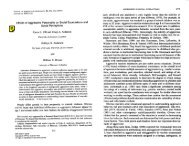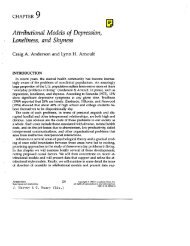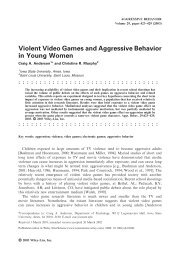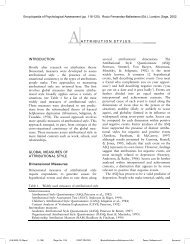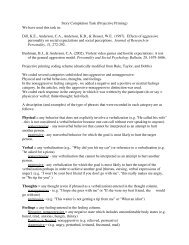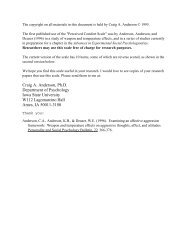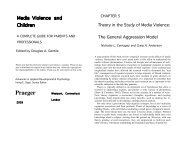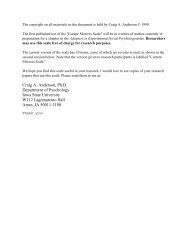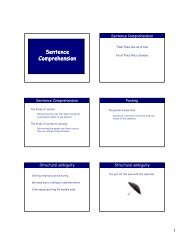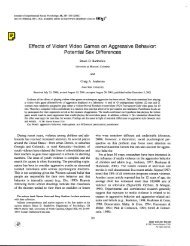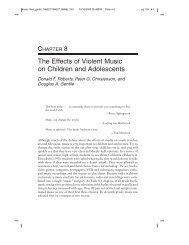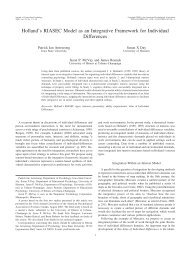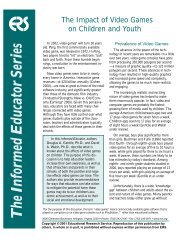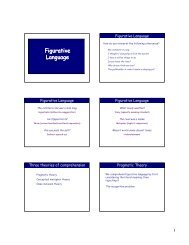Shana K. Carpenter - Department of Psychology - Iowa State ...
Shana K. Carpenter - Department of Psychology - Iowa State ...
Shana K. Carpenter - Department of Psychology - Iowa State ...
You also want an ePaper? Increase the reach of your titles
YUMPU automatically turns print PDFs into web optimized ePapers that Google loves.
CONFERENCE POSTERS: (graduate student author, undergraduate student author)<br />
Mullaney, K. M., & <strong>Carpenter</strong>, S. K. (2012). The benefit <strong>of</strong> spacing on retention and transfer<br />
<strong>of</strong> mathematics knowledge. Poster presented at the annual meeting <strong>of</strong> the<br />
Psychonomic Society, Minneapolis, MN.<br />
Olson, K., & <strong>Carpenter</strong>, S. K. (2011). Delaying feedback helps, but only if you want to know<br />
the answer. Poster presented at the annual meeting <strong>of</strong> the Psychonomic Society,<br />
Seattle, WA.<br />
Olson, K., & <strong>Carpenter</strong>, S. K. (2011). Learning new vocabulary through scaffolded feedback.<br />
Poster presented at the annual meeting <strong>of</strong> the Midwestern Psychological Association,<br />
Chicago, IL.<br />
<strong>Carpenter</strong>, S. K., & Vul, E. (2009, November). The delay-<strong>of</strong>-feedback benefit: Timing vs.<br />
duration. Poster presented at the annual meeting <strong>of</strong> the Psychonomic Society, Boston,<br />
MA.<br />
Kang, S., <strong>Carpenter</strong>, S. K., Pashler, H., & Rohrer, D. (2009, November). Is subsequent<br />
learning hurt by prior erroneous guessing? Poster presented at the annual meeting <strong>of</strong><br />
the Psychonomic Society, Boston, MA.<br />
Kang, S., <strong>Carpenter</strong>, S. K., Rohrer, D., & Pashler, H. (2009, June). Does guessing when one<br />
doesn’t know the answer hurt subsequent learning? Poster presented at the annual<br />
meeting <strong>of</strong> the Institute <strong>of</strong> Education Sciences, Washington, DC.<br />
<strong>Carpenter</strong>, S. K., Pashler, H., & Jones, J. J. (2008, November). The effects <strong>of</strong> retrieval<br />
practice on associative recall <strong>of</strong> word pairs. Poster presented at the annual meeting<br />
<strong>of</strong> the Psychonomic Society, Chicago, IL.<br />
<strong>Carpenter</strong>, S. K., Pashler, H., Rohrer, D., & Coburn, N. (2008, June). Using retrieval practice<br />
to enhance learning <strong>of</strong> complex anatomy structures. Poster presented at the annual<br />
meeting <strong>of</strong> the Institute <strong>of</strong> Education Sciences, Washington, DC.<br />
<strong>Carpenter</strong>, S. K., & Pashler, H. (2008, May). Using retrieval practice to enhance learning <strong>of</strong><br />
complex visual information. Poster presented at the annual meeting <strong>of</strong> the Association<br />
for Psychological Science, Chicago, IL.<br />
<strong>Carpenter</strong>, S. K., Pashler, H., Cepeda, N. J., & Alvarez, D. (2008, February). Using tests to<br />
enhance 8 th grade students’ retention <strong>of</strong> U. S. history facts. Poster presented at the<br />
annual student/postdoc meeting <strong>of</strong> the Science <strong>of</strong> Learning Center, Pittsburgh, PA.<br />
Jones, J. J., Pashler, H., & <strong>Carpenter</strong>, S. K. (2008, January). Statistical learning for passively<br />
viewed, actively recorded and explicitly predicted sequences. Poster presented at the<br />
annual meeting <strong>of</strong> the Temporal Dynamics <strong>of</strong> Learning Center, Nashville, TN.<br />
<strong>Carpenter</strong>, S. K., Pashler, H., Cepeda, N. J., & Alvarez, D. (2008, January). Using tests to<br />
enhance 8 th grade students’ retention <strong>of</strong> U. S. history facts. Poster presented at the<br />
annual meeting <strong>of</strong> the Temporal Dynamics <strong>of</strong> Learning Center, Nashville, TN.<br />
<strong>Carpenter</strong>, S. K., Pashler, H., Rohrer, D., & Cepeda, N. J. (2007, August). Does forced<br />
guessing cause one to learn the wrong answer? Poster presented at the symposium<br />
on Memory Dynamics and the Optimization <strong>of</strong> Instruction, American Psychological<br />
Association, San Francisco, CA.<br />
6



